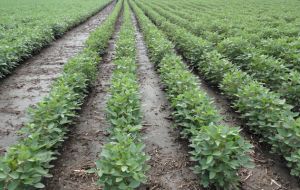MercoPress. South Atlantic News Agency
New rush of foreign investors, mainly Argentines, to purchase land in Uruguay
 Over a million hectares are now planted with soybeans
Over a million hectares are now planted with soybeans Interest in fixed assets, strong commodities’ prices and growing prospects that global demand for food producing land will continue have generated a new rush of foreign investors to buy land in Uruguay.
“The equation is perfect for foreign investors: high prices for commodities, strong demand for grains, oil-seeds, beef and other farm produce and a depreciation of the US dollar”, says Sebastian Da Silva from Da Silva Agro-assets.
In the first half of this year there have been 950 farmland transaction operations registered, 9.3% more than the same period in 2009, which represents 180.000 hectares (up 25.8%) involving 451 million US dollars (up 37.5%) according to official numbers from Uruguay’s Agriculture Statistics Department.
Da Silva points out that this becomes a “virtuous circle” because new investors arrive in Uruguay paying prices “that far from been considered speculative” force the use of the latest farm production technology and the most added value component possible.
Buyers are not only private investors. Recent business delegations from Iran and Qatar expressed strong interest in buying farmland in Uruguay to develop their own production projects. The proposal was done directly to president Jose Mujica, who anticipated in public statements that Uruguay would not sell land to sovereign buyers.
Concern over growing ownership of land in Uruguay has prompted Parliament to draft legislation making it more difficult for such operations particularly when sovereign funds are involved.
Local farmland operators have denied having received any specific interest from countries or sovereign funds, but besides the above countries, strong delegations from Saudi Arabia and Colombia recently visited Uruguay and according to political sources asked about Uruguay’s position regarding the controversial issue.
Although there are no official numbers regarding the percentage of Uruguay’s 16 million hectares of farmland in foreign hands, estimates from the 2000 Agriculture Census are in the range of 11%.
Regarding prices, good farmland, with easy access to the transport system has been sold in the range of 7.000 to 9.000 US dollars per hectare. Prices are sustained because owners are not interested in selling given the strong commodities prices or the high rents.
This new wave of buyers comes mostly from Argentina, and to a lesser extent Brazil and are mostly interested in good farmland, long term projects and profits, according to Da Silva.
“Many Argentines come looking for political stability, clear rules of the game, respect for private contracts and want to live in Uruguay in their acquired fields. Many even request as part of the deal Uruguayan resident papers”, revealed Da Silva.
However most of the land is purchased by large agro-business groups already operating in Uruguay and wanting to expand their activities.
“I’d say 30% of the land goes to individual farmers and the remaining 70% to the large groups”, said Eduardo Caldeyro also in the business of selling farmland.
Another consequence of the growing interest for good farmland is that cattle-breeding is also changing. While traditional grasslands are turned over to grains cattle has to move to poorer land or a relatively new industry for Uruguay, feed-lots.
Farmland prices in Uruguay began climbing in 2003 with the expansion of agriculture. Currently Uruguay has a million hectares with soy beans, when less that a decade ago the area was barely 200.000 hectares.




Top Comments
Disclaimer & comment rules-

-

Read all commentslittle acorns ?
Nov 01st, 2010 - 08:52 pm 0I am dismayed to hear that the cattle industry is looking to utilize feed lots rather than to continue its grass fed history. If they move too much in that direction, that decision will undermine the world perception that all Uruguayan beef is strictly grass fed, and then trust in the product will be lost. Prices will drop and the industry will have cut off its nose to spite its face. This is very poor long range thinking. As well, in the soy and rice industries, the increasing and indiscriminate use of herbicides and pesticides will undermine the perception that Uruguay grows “clean” food. Very bad judgement here!
Nov 02nd, 2010 - 04:13 pm 0Commenting for this story is now closed.
If you have a Facebook account, become a fan and comment on our Facebook Page!